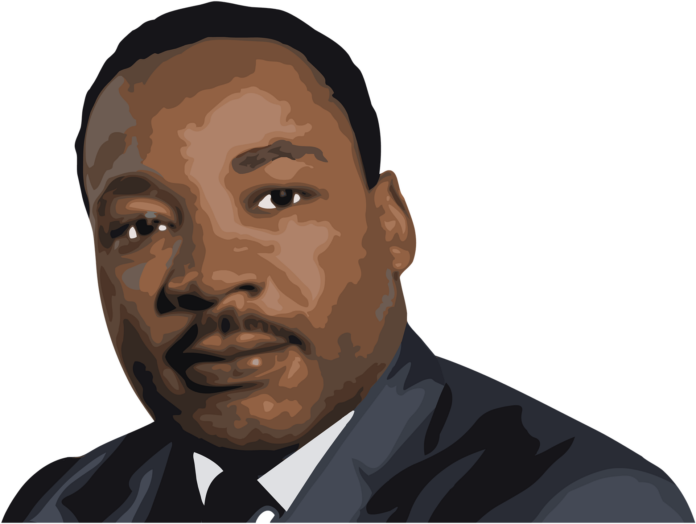Before and after his April 4, 1968 assassination, legendary activist, religious figure and Dr. Martin Luther King, Jr. has made a significant impact on America to this day.
His impact is so strong, America started to observe a federal holiday in his name — known as Martin Luther King Jr. Day. In 1983, former U.S. President Ronald Reagan signed the holiday into law and it was first observed three years later. It falls on the third Monday of January for each year.
On Jan. 15, 1929, Martin Luther King, Jr. [born Michael King, Jr. ] was born in Atlanta, Georgia. His father, Martin Luther King, Sr., was a reverend, Baptist pastor and Civil Rights figure. His mother, Alberta was a teacher before retiring to be a homemaker. In addition to MLK, Alberta gave birth to two other children, a boy and a girl.
King’s family, including his mother prior to her teaching career, came from a long line of Christian pastors and preachers, yet while some people may refuse to continue in their family’s footsteps, King stuck to his roots.
In the ‘60s, racial tensions were very high. The ‘60s were a time of significant change in American culture. Music was changing, politics were changing, and people were changing. Yet most people’s views on race weren’t. By each decade, Americans’ opinions are always going to be at change, but in this case, accepting other ethnic groups’ views and ideals was difficult.
Perhaps what his lasting impact is known for/biggest accomplishment was the famous “I Have a Dream” speech. At an Oct. 14, 1964 march on Washington, King, as best as he could, aimed to combat racial inequality. For his efforts that day, he ended up receiving the Nobel Peace Prize for combating racial inequality through nonviolence.
He orchestrated the Selma to Montgomery march, which were a series of protests in 1965 in Alabama, a very conservative and unshakable state at the time. Prior to King’s arrival there, the marches were violent and out of control. After his arrival and soft spoken words, Alabama police grew to relax a little bit and the overall population listened and learned. He was aiming more and more to bring about a national Voting Rights Act.
Soon after, King joined forces with the Southern Christian Leadership Conference (SLCS), to help speed up his ultimate goal of tackling inequality and a lack of respect for minorities.
Prior to King’s famous speech, alongside the SLCS in 1962, he lost a fight for segregation in Albany, Georgia. But he stuck to his guns, never gave up, never caved in, never went against what he believed in, and thus, he came out on top. His nonviolent protests were eye opening and gave way to even more supporters who wanted the same freedom. He is arguably the greatest public speaker over the past century.
Over the war on poverty, U.S. President Lyndon B. Johnson held important meetings with King. Joseph A. Califano, Jr., who was Johnson’s top aide at the time, claimed in a Washington Post story years ago that Johnson was supportive of King and was enthusiastic about voting rights. He further commented that Johnson strongly encouraged King to run a deep protest in around the Selma area.
King’s honesty, respect, nonviolence, strong, motivational protests and beliefs caught Johnson’s eye [both when he was President John F. Kennedy’s V.P. and when he took over for him as President], and the two shared a mutual respect for one another.
This led to, most importantly of all, Johnson signing the 1964 Civil Rights Act on July 2. Never to forget, MLK was in attendance during Johnson’s signing of the act, too. The act outlaws discrimination based on race, color, religion, sex or national origin. King’s ultimate goal finally came true.
A year later, Johnson signed another law, The Voting Rights Act of 1965. The law aimed to overcome legal barriers at the state and local levels that prevented African Americans from exercising their right to vote. This was guaranteed under the 15th Amendment of the U.S. Constitution.
King has been praised by hundreds of political leaders, religious figures, numerous U.S. presidents and, most importantly, respected and honored by millions of Americans, especially the ones with whom he fought with/for at the time of his numerous protests.
Some people think of the ‘60s as the generation of the Baby Boomers, some people look at the decade from an entertainment standpoint [such as the popularity of the color TV], but I grew to recognize it for the movement of racial equality. It all stems from one man’s ability to bring a nation of races together, to aim to respect one another regardless of one’s ethnicity.
Despite his assassination, King stood for what he believed in and, most importantly, made one of the biggest impacts in U.S. history over the past five plus decades. Even as time continues, his impact will never significantly change nor stagnate. Up there with the likes of Malcolm X, King is regarded as one of, if not the, greatest African American leaders of all time.
For questions/comments about this story, email editor@thewhitonline.com or tweet @TheWhitOnline.






[…] Source […]